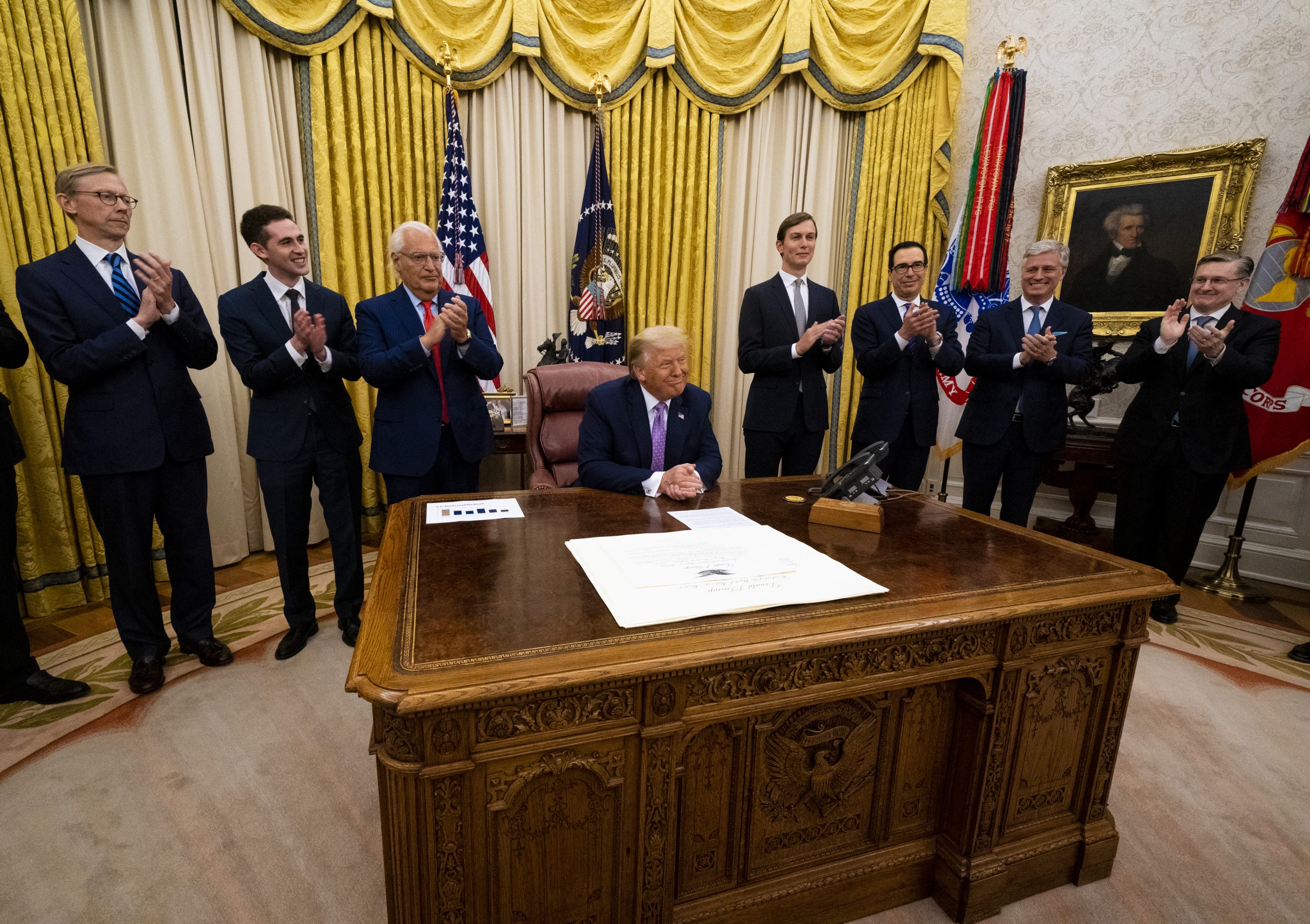Peace Through Stability

President Trump has so far been a remarkably successful foreign-policy president. His success lies in his ability to identify America’s national interest clearly and pursue it without regard to outdated ideological investments.
He recognized that China is a strategic economic threat and not a partner in prosperity. He killed an Iranian commander whose life’s work was the exportation of war and terror—Qasem Soleimani—but he refused to order retaliatory strikes against Iran for the downing of a U.S. surveillance drone when he was told they might cost the lives of 150 Iranian troops. Although perfectionist doves loathe the use of any force whatsoever, Trump’s actions were maximally antiwar as well as pro-American: he eliminated an exporter of war and sent a resounding message to the murderer’s masters, but he did not engage in needless killing in the service of ideology or pride. He drew the right lines.
The president’s bold diplomacy with Pyongyang has not produced a breakthrough on the Korean peninsula as yet, but it has at least opened new possibilities, which the rigid approach of previous administrations precluded. In the Arab world, meanwhile, the president’s peace initiatives have recently paid a surprising dividend with the announcement last week that the United Arab Emirates would normalize relations with Israel. In return, Israeli Prime Minister Binyamin Netanyahu has agreed to postpone plans to annex the West Bank.
This is cold comfort to the Palestinians, who have made their feelings of betrayal by the UAE known. But realistic diplomacy is not about making everyone happy—it’s about pursuing stability, and the deal between Israel and the UAE brokered by the Trump administration is a significant advance in that direction.
Ironically, the Middle East failures of the last two administrations readied the stage for President Trump’s success. The Iraq War launched by the Bush administration (with the support of Democrats like Joe Biden, of course) destroyed the Saddam Hussein regime that had kept a check on Iranian power. More than that, it destabilized Iraq, and ultimately Syria as well, in ways that created channels for wider Iranian influence. The Obama administration then exacerbated these conditions with the JCPOA “Iran Deal” that further loosened restraints on the Islamic Republic. Bush’s war and Obama’s idea of peace both built-up Iranian power.
The expanding reach of Tehran in turn changed strategic calculations for Gulf states like the Emirates. UAE joined Saudi Arabia in a bloody proxy war with Iran over Yemen. Now, as a more peaceful kind of balancing, UAE is strengthening its relationship with Israel, the heaviest counterweight to Iran. More choice of partners means more freedom in the tangled politics of the Persian Gulf, and UAE’s opening to Israel will also in the long run give the Emirates more room to maneuver with Saudi Arabia.
Improved relations with the United States are another obvious attraction for UAE. Israel, for its part, also has anti-Iranian coalition-building in mind, as well as finally putting an end to the now archaic and ritualized hostility of the Arab world to Israel’s very existence. For Arab autocrats the Palestinians were for decades a convenient distraction from discontents at home, a focus for moral outrage. That ploy has begun to wear thin, however, even as Israel’s neighbors find themselves increasingly compelled to devote their attention to the regional ambitions of Iran, Russia, and Turkey. The internal and external politics of the Arab states have moved away from the disposition that had made the Palestinians so prominent.
The collapse of the Israeli left over the past two decades has altered the terms of engagement with the Arab world as well: the prospect of any generous deal for the Palestinians appears negligible, and the possibility may have been a phantom of the liberal imagination all along. But while such a possibility was at least conceivable, it encouraged the Arabs to hold out. Today everyone knows the “Two-State Solution” is a mirage, and why let a mirage stand in the way of real strategic and economic interests?
For the Arab states, the latter include carefully managing a transition away from their over-dependence on oil, in an era when spikes in petroleum prices can be offset by the increase in shale oil production by the United States. The oil states now have to live with a price ceiling that is also a limit on their political clout at home and abroad. And they have long known that their dependence on oil is a profound vulnerability, one for which there may be no cure, but that can at least be ameliorated through technological development and trade. Israel is an invaluable partner for both purposes.
What the Trump administration has done is to harness these developments for the purpose of greater peace, and if it appears that what the administration has not done is at least as important as what it has done, in considering what it has accomplished here, that is no less to the credit of the president and his team.
Had Hillary Clinton or a Republican like Mitt Romney or Jeb Bush been in the White House these past three years, the U.S. would have followed the same playbook of meddlesome and counterproductive intervention that the George W. Bush and Obama administrations employed. There would be regime change in Damascus or a vigorous ongoing attempt at one, and American policy experts would be incessantly busy with their attempts to micromanage and artificially balance the region’s powers along with the ideological baggage that smart Americans with no “skin in the game” always bring to world affairs.
Donald Trump can succeed where the others fail because he is transactional, not ideological, and he looks out for the American interest—which is peace through stability—rather than trying to bring about peace through perfection, as ideology and technocratic hubris demand.
Comments